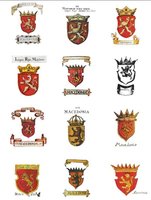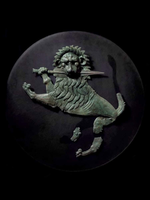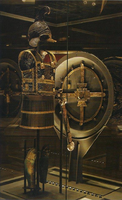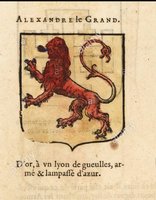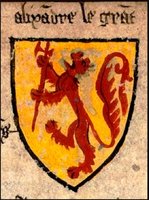Прегледај го приврзокот 293773
Kako sto znam grcite lavot ne go ni gledat kako simbol!
Za koja Makedonia stanuva zbor ? Grcka ?
I ima li si vrska ovoj lav so antickite makedonci?
I dali voopsto lavot si ima vrska so antickite makedonci?
Македонскиот средновековен лав е еден од доказите за континуитетот, тоест поврзаноста на средновековните со античките Македонци. Се знае дека лавот и сонцето биле најуважуваните симболи кај античките Македонци, што не важи и за античките Грци.
Во врска со јазикот е дискутабилно, доминира тезата дека "дошле" Словени кои прифатиле име и некои од обичаите на домородците, но нивниот јазик надвладеал, но за ова нема цврсти докази...
Истовремено и за античкиот македонски јазик скоро и да нема сочувани или откриени позначајни текстови, веројатно поради фактот дека грчкиот јазик и писмо се користеле во формалната комуникација во речиси сите империи од тој период. Интересно,но од античките извори дознаваме дека дефинитивно тоа бил јазик кој што не го разбирале Грците, а Римјаните јасно го претставувале како јазик, а не дијалект. Ова е извадок и елаборација на еден од тие римски извори:
[1]
Quintus Curtius Rufus "The History of Alexander"
"Alexander the Great speaks in front of the Macedones of his army: "The Macedonians are going to judge your case," he said. "Please state whether
you will use your native language before them."
Philotas: "Besides the Macedonians, there are many present who, I think, will find what I am going to say easier to understand if I use the language you yourself have been using, your purpose, I believe, being only to enable more people to understand you."
Then the king said: "Do you see how offensive Philotas find even
his native language? He alone feels an aversion to learning it. But let him speak as he pleases - only remember he as contemptuous
of our way of life as he is of our language". [p.138]
This is Alexander himself talking about "our way of life" and "our language" "Macedonians are going to judge your case" There is no need for any explanation.
[2] Eugene Borza. "The lesson is clear: the use of the Greek language as a form of written expression does not by itself identify the ethnicity of a culture". ("In the Shadow of Olympus -The Emergence of Macedon", p. 94.)
"As the Macedonians settled the region following the expulsion of existing peoples,
they probably introduced their own customs and language(s);
there is no evidence that they adapted any existing language, even though they were now in contact with neighboring populations who spoke a variety of Greek and non-Greek tongues."
"Hammond's firm conclusion that the Macedonian spoke a distinctive dialect of Aeolic Greek is unconvincing to me, resting as it does on an interpretation of a bit of myth quoted by Hellanicus, who made Aeolus the father of the legendary progenitor Macedon". ("In the Shadow of Olympus" p.92.)
"The handful of surviving genuine Macedonian words - not loan words from a Greek - do not show the changes expected from a Greek dialect. And even had they changed at some point it is unlikely that they would have reverted to their original form". ("In the Shadow of Olympus" p.93.)
"As a question of method: why would an area three hundred miles north of Athens - not colonized by Athens - used an Attic dialect, unless it were imported? That is, the Attic dialect could hardly be native, and its use is likely part of the process of Hellenization. To put the question differently: if the native language of the Macedonians is Greek, what is its Macedonian dialect?"
"On the matter of language, and despite attempts to make Macedonian a dialect of Greek, one must accept the conclusion of linguist R.A.Crossland in the recent CAH, that an insufficient amount of Macedonian has survived to know what language it was".
[3] Earnst Badian
"Stadies in the History of Art vol. 10: Macedonia and Greece In Late Classical and Early Hellenistic Times"
Regarding the Cleitus' episode, Ernst Badian writes: "He used the only language in which his guards could be addressed".. [Note: The guards could be addressed in Macedonian language.]
Episode #2. Eumenes of Cardia. In 321 B.C., Greek commander Ambiance, with cavalry and light arms only, faced the Macedonian noble, Neoptholemus, with the Macedonian phalanx. To avoid battle Xennias, a man
whose speech was Macedonian, was sent by Eumenes to negotiate with the commander of the phalanx. Badian analyzes:
"Now, Xennias' name at once shows him to be a Macedonian. Since he was in Ambiance entourage he was presumably a Macedonian of superior status, who spoke both standard Greek and his native language. He was the man who could be trusted to transmit Ambiance' message. This clearly shows that
the phalanx had to be addressed in Macedonian, if one wanted to be sure (as Ambiance certainly did) that they would understand. And almost equally interesting - he did not address them himself, as he and other commanders normally address soldiers who understood them, nor did he sent a Greek. The suggestion is surely that
Macedonian was the language of the infantry and that Greek was a difficult, indeed a foreign language to them. We may thus take it as certain that, when
Alexander used Macedonian in addressing his guards, that too was because it was their normal language, and because (like Ambiance) he had to be sure he would be understood".
[4]
Ulrich Wilcken in his book
'Alexander the Great' on p.22 notes that
"linguistic science has at its disposal a very limited quantity of Macedonian words" [Wilken mentions Macedonian and not Greek words]
[5]
"The Tumult and the Shouting: Two Interpretations of the Cleitus Episode", (published by APA in The Ancient History Bulletin, Vol. 10, number 1, 1996) [I will not endeavor myself with "their" Hammond-Bosworth fight, for obvious reasons. What I will do, however, is lift certain references where these giants, specifically, deal/address the ancient Macedonian language in question.]
[6] p.20, line 23.
"Alexander shouted out in Macedonian, and called the hypaspists in Macedonian".
[7] p.25, line 4.
"In my view", writes Bosworth, " there is nothing at all surprising in the use of Macedonian. Alexander was calling his hypaspists, who were Macedonians, and he addressed them in their native language/dialect. In Hammond's view, however, the hypaspists would normally have been addressed in standard Greek. Macedonian proper he restricts to the people of the old kingdom, Lower Macedonian, while the tribes of the mountain districts of Pindus (Upper Macedonia) spoke a dialect of West Greek.
The evidence for this hypothesis is decidedly tenuous."
[8] p.25 elaboration: Bosworth cont. "I deliberately refrain from adopting any position on the linguistic status of ancient Macedonians. It has little significance outside the nationalistic propaganda of the contemporary Balkan states, in which prejudice and dogma do duty for rational thought. What matters for the present argument is the fact,
explicit in Curtius, that Macedonian was largely unintelligible to non-Macedonians. Macedonians might understand Greek, and some Greek (like Eumenes) with experience of Macedon might speak Macedonian. However, even Eumenes took care that a vital message was conveyed to the phalangites of Neoptholemus by a man fluent in Macedonian."
[9] p.30, line 28, we find the final statement by Bosworth:
"He used Macedonian because the troops would instantly understand and (he expected) would react immediately. There is no need for more complicated explanation."


